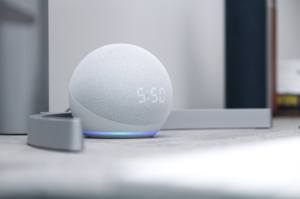
In 2022, Alexa, Amazon’s voice assistant, is not yet profitable and continues to be a financial drain, costing ten billion euros over the year. In search of the next technological and economic evolution, the tech giants are investing billions in research and new products, such as Meta’s Metavers or Amazon’s Alexa.
According to Business Insider, the Alexa voice assistant, created ten years ago, has never been profitable, and the estimated annual loss is taking its toll on the Amazon department, which is also responsible for the Amazon Prime Video streaming service. Employees told the news site that this branch of Amazon was in crisis, facing a colossal failure of imagination and a wasted opportunity.

The Wall Street Journal, for its part, had been able to obtain documents earlier in the year indicating that this Amazon department employs around 10,000 people and records an annual loss of five billion dollars. Amazon’s original aim with Alexa was to monetize voice searches linked to business customers, and had forged unsuccessful partnerships with Uber and Domino’s Pizza.
According to Fortune magazine, users mainly use Alexa to set the alarm clock, play music or make calls, which cannot be monetized. With Alexa, Amazon ranks third in terms of the number of voice assistant users, with 71.6 million, behind Google Assistant and its 81 million users, and Apple’s Siri in second place, with 77 million users.
Tech giants such as Meta, Twitter, Amazon and Microsoft are currently in a state of turmoil, and are being forced to freeze hiring and lay off a large number of staff. These layoffs are estimated to total around 122,000 for the tech sector by 2022, as it suffers enormously from the restrictive policies of central banks. This situation has prompted some specialists to say that the heyday of the tech industry is over.
We have to ask ourselves: is time running out for Big Tech’s voice assistants? Everyone seems to be having trouble with them. Google expressed fundamentally identical problems with the Google Assistant business model last month. There’s an inability to monetize the simple voice commands that most consumers actually want to do, and all of Google’s attempts to monetize the assistants with ads and corporate partnerships haven’t worked. With the product absorbing server time and being a big financial loser, Google reacted just as Amazon did by cutting the division’s resources.
While Google and Amazon hurt each other in a price war, Apple’s smart speaker plans were more results-oriented. The HomePod’s original $350 price tag was much more expensive than the competition, but it was probably a more sustainable business model. But Apple’s model didn’t appeal to consumers, and the original HomePod was killed off in 2021. There’s still a $99 “mini” version, and Apple isn’t abandoning the idea of a large speaker, with a supposed return in the works. Siri can at least be a loss leader for iPhone sales, but Apple is also looking for more ongoing revenue from advertising.



Comment here